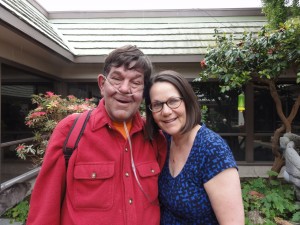Mission Hospice care team lets Julie Hoffman be a sister again
 April 2015
April 2015
Julie Hoffman is probably as knowledgeable as anyone about caring for a mentally ill loved one. Her brother, Ed, now 61, was diagnosed with schizophrenia as a teenager, when she was 8. Her parents helped found the National Alliance on Mental Illness (NAMI), and she served as a resource on mental health issues throughout her career in California state government. She also is a former member of the San Mateo County Mental Health Board.
But when Ed was diagnosed with terminal chronic obstructive pulmonary disease (COPD) last year, she was at a loss about finding appropriate help.
“It’s not easy to find care for mental health patients who are terminally ill and are oxygen dependent,” she said during a recent interview.
She credits Mission Hospice & Home Care social worker Meechal Hall with arranging placement for Ed in a nursing facility in Moss Beach, where he receives regular visits from Hall and other hospice staff, including nurse Manny Ong, and spiritual counselor Rev. Don Mulford.
Ed, who spent most of his adult life in a state mental facility in Napa, was admitted to the Mission Hospice program, but later improved enough to be discharged into the Transitions program (see sidebar on page 3), before being readmitted recently to hospice care.
Julie said her brother is a “compliant” patient in that he takes the medication that helps control his schizophrenia. Consequently, people sometimes wonder why a man who can feed and dress himself needs to be in a nursing home. However, Ed is reluctant to discuss how he feels, so staff has to be especially vigilant about his condition. Julie remembers Ed telling a doctor once that he didn’t know why his sister had brought him in, though he was speaking through lips that were blue from lack of oxygen.
“It’s especially important for caregivers to be attuned to the needs of patients who won’t voluntarily communicate pain or anxiety,” said Meechal, adding that the mentally ill present special challenges in end-of-life care. The demand for services for older people with mental health issues is expected to grow disproportionately to the general population, according to NAMI, due to the Baby Boomers’ higher rates of depression, anxiety disorders, and substance abuse disorders, along with decreasing social stigma (resulting in increased diagnosis) and the increased life span of people with serious mental illness.
For the Hoffmans, the issue is far more personal. Having Mission Hospice working with them has improved the quality of life of both siblings.
“Because of the support that Ed and I get from Mission Hospice, for once in my life, I feel like I can relax, and be me,” Julie said. “I don’t have to be always on call for everything – I can be a sister again.”
